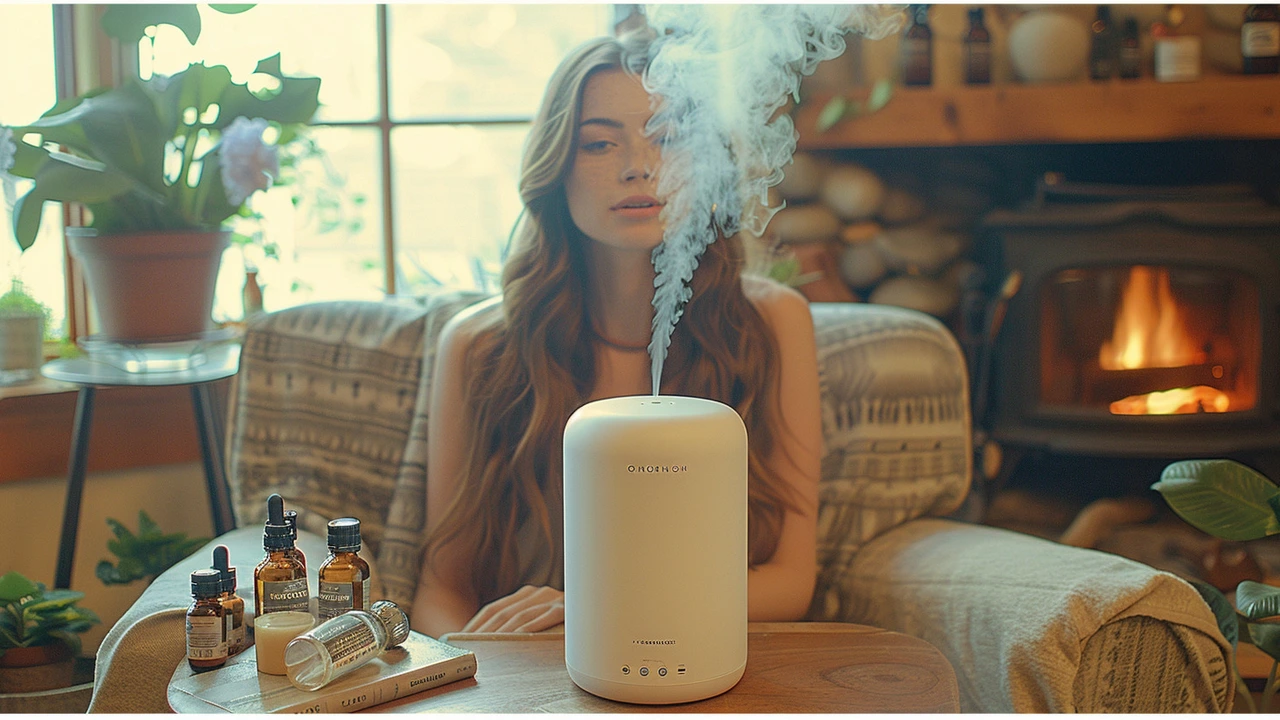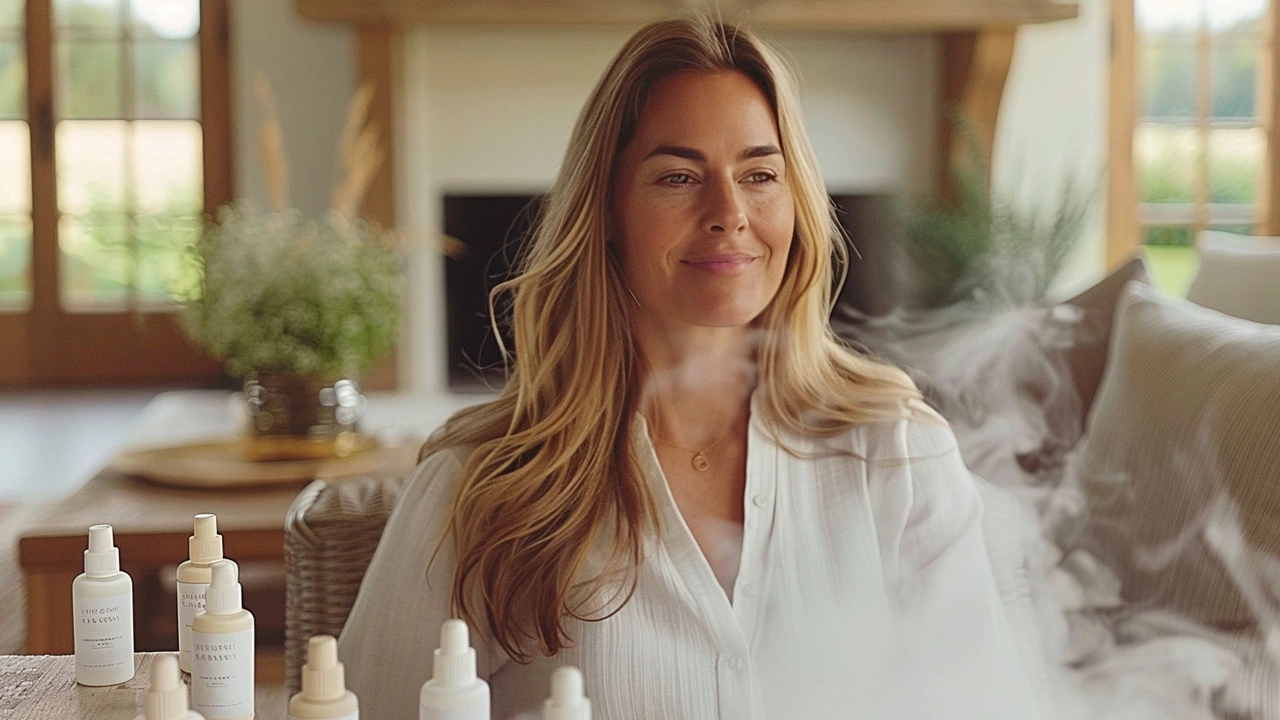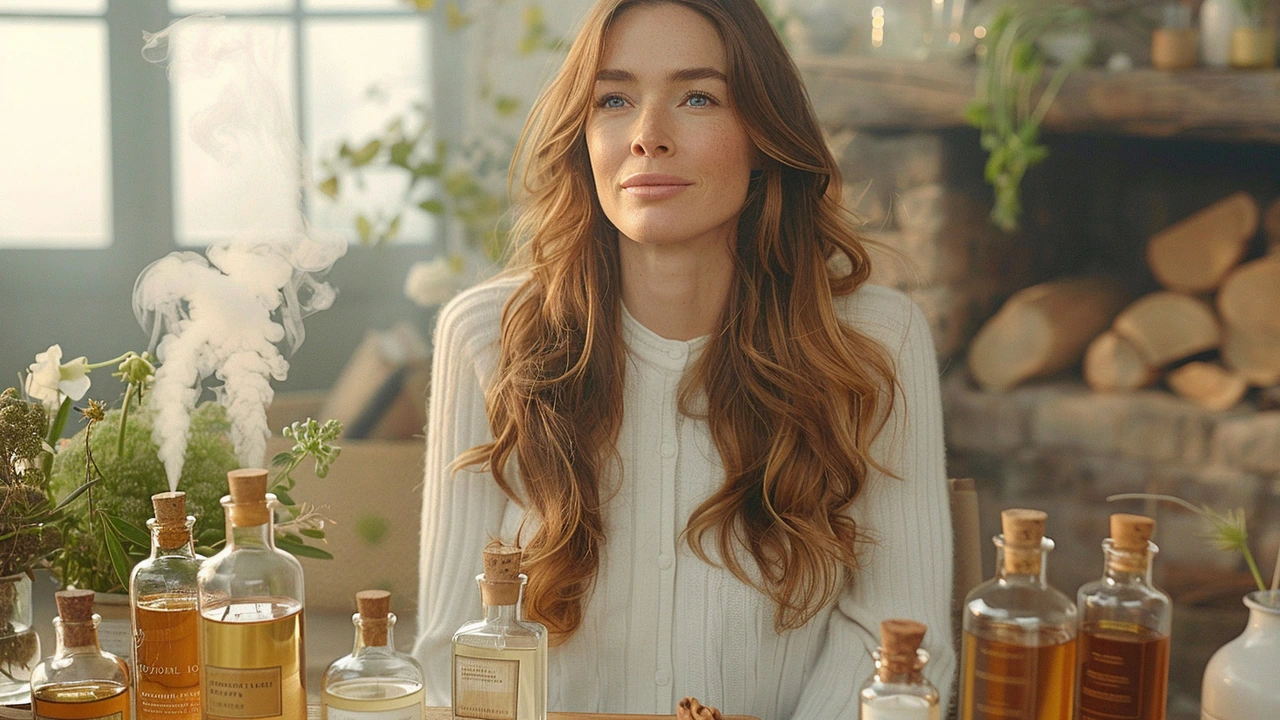
Aromatherapy is more than just pleasing scents; it's a holistic practice that uses essential oils to promote physical and mental well-being. By tapping into the healing properties of plants, aromatherapy can offer a natural way to relax, relieve stress, and even address specific health issues.
From ancient civilizations to modern times, the therapeutic use of aromatic plant extracts has been cherished for its calming and healing effects. Essential oils, which are highly concentrated plant extracts, are the cornerstone of aromatherapy. Different oils offer different benefits, from improving sleep to boosting energy levels.
Dive into the world of aromatherapy to discover how these potent plant essences can easily become part of your daily routine, enhancing both your mood and health in delightful, fragrant ways.
- Understanding Aromatherapy
- The History of Aromatherapy
- Benefits of Essential Oils
- How to Use Aromatherapy
- Choosing the Right Essential Oils
- Tips for Safe Use
Understanding Aromatherapy
Aromatherapy, often associated with the use of essential oils, involves the use of these potent plant extracts to promote both mental and physical well-being. The essence of aromatherapy lies in its ability to activate the smell receptors in the nose, sending messages through the nervous system to the brain. This leads to the triggering of various biological responses that can impact mood, stress levels, and overall health.
Historically, aromatherapy has been employed by civilizations such as the Egyptians, Greeks, and Chinese, highlighting its long-standing significance in traditional healing practices. Essential oils like lavender, peppermint, and eucalyptus have specific properties that make them ideal for treating different ailments. Lavender, for instance, is well-known for its calming effects, while peppermint can help with headaches and boosting energy.
The practice of aromatherapy can take various forms, from diffusing essential oils into the air, adding them to bathwater, to massaging them into the skin. Each method offers a unique advantage and can be tailored to individual needs. For example, using a diffuser can fill a room with a soothing ambiance ideal for relaxation, whereas applying oils directly to the skin can provide targeted relief for sore muscles or inflammation.
Aromatherapy's benefits are vast, encompassing physical relief, emotional balance, and spiritual wellness. For those new to this form of therapy, it's important to understand that not all essential oils are created equal. Only pure, high-quality oils should be used to ensure safety and efficacy. A study published in the Journal of Clinical Psychology found that patients who inhaled essential oils felt significantly less anxious before medical procedures compared to those who didn’t.
The science behind aromatherapy is continuously evolving. Research indicates that certain essential oils have antimicrobial effects and can even contribute to pain management. This further underlines the medical community’s growing interest in integrating natural forms of healing into mainstream healthcare. Though more research is needed, the existing data is promising and supports the various anecdotal evidence.
"Aromatherapy can be an excellent complementary treatment for both physical and mental conditions," says Dr. Jane Buckle, a notable expert in the field. "When used wisely, it holds the potential to bring about significant improvements in individual well-being."
The Mechanism of Action
A detailed understanding of how aromatherapy works begins with the olfactory system. When essential oils are inhaled, their aromatic molecules travel up the nose and trigger the olfactory nerves, which then send signals to the limbic system in the brain. This system is linked to emotional regulation, which is why aromas can evoke strong emotional reactions or memories. The limbic system also interacts with the hypothalamus, influencing hormonal activity and thus affecting bodily functions like sleep or digestion.Given its holistic nature, aromatherapy invites users to engage all their senses and connect more profoundly with their environment. Whether it's through a calming bedtime routine or a refreshing morning ritual, the consistent use of essential oils can markedly enhance one’s quality of life.
Benefits of Essential Oils
Essential oils are more than just fragrant liquids contained in small bottles; they hold a myriad of benefits that can enhance everyday life by supporting both your physical and mental health. Extracted from plants, these potent oils serve various purposes, and their effects can be quite profound.
One of the most well-known benefits of essential oils is their ability to help with stress and anxiety. Oils such as lavender, chamomile, and frankincense are commonly used for their calming properties. Lavender, for instance, is renowned for its ability to promote relaxation and better sleep. A drop or two on your pillow at night or a quick sniff during a stressful moment can make a world of difference.
In addition to calming effects, essential oils can also boost mood and energy levels. Citrus oils like lemon, orange, and grapefruit are uplifting and invigorating. Diffusing these oils in your home can help you start the day with a positive mindset and increased focus. In fact, studies have shown that lemon oil, in particular, can improve concentration and reduce stress.
Essential oils also have significant antiviral and antibacterial properties. Tea tree oil is a prime example, known for its powerful antiseptic capabilities. It can be used in homemade cleaning solutions to disinfect surfaces or applied topically, diluted, to treat minor cuts and infections. Eucalyptus oil is another great option, often used to relieve cold symptoms due to its ability to clear nasal congestion and ease respiratory issues.
“Essential oils may benefit your health by reducing anxiety and stress levels, improving sleep, and even alleviating some symptoms of illness,” says Dr. Axe, a certified nutrition specialist and author of numerous health books.
Peppermint and rosemary oils have been found to improve mental clarity and relieve headaches. Just a few drops massaged into the temples or inhaled from a diffuser can provide quick relief. Similarly, ginger and black pepper oils can be combined for their anti-inflammatory qualities, beneficial for muscle pain and arthritis symptoms.
Using Essential Oils for Skin Care
For those who want a natural approach to skincare, essential oils provide a treasure trove of benefits. Tea tree oil can be an effective treatment for acne, while lavender oil is known for its soothing effects on irritated skin. Rosehip oil is celebrated for its ability to reduce the appearance of scars and wrinkles, making it a popular choice in anti-aging routines. These oils, when used consistently, can significantly improve the texture and appearance of the skin without the harsh chemicals found in many commercial products.
Digestive Health Benefits
Some essential oils can also assist in digestion. Peppermint oil is commonly used to alleviate symptoms of irritable bowel syndrome (IBS) and general digestive discomfort. Ginger oil has similar benefits and can combat nausea and motion sickness effectively. The key to using essential oils for digestion is often in the preparation and dosage, as even a small amount can deliver potent results.
Essential oils are incredibly versatile and can be integrated into various aspects of life to promote better health and wellbeing. Whether you're looking to relax, boost your mood, improve your skin, or support your digestion, there is likely an essential oil that fits the bill. By understanding the specific advantages of different oils, you can create a personalized approach to your health that is both natural and effective.

How to Use Aromatherapy
Using aromatherapy can be simple and doesn't require you to be an expert. Whether you're looking to enhance your mood, alleviate stress, or treat certain health conditions, there are several ways to use essential oils effectively.
One common method is inhalation. This can be done through a variety of techniques. The most direct way is simply to take a deep breath directly from the bottle, but a more sophisticated approach involves using a diffuser. Diffusers disperse essential oils into the air, making it convenient and easy to breathe in the healing aromas throughout your home. Some diffusers use water and ultrasonic waves to disperse the oils, while others use heat or even just a gentle breeze.
Another popular method is topical application, where essential oils are applied directly to the skin. It’s important to mix the essential oil with a carrier oil, such as coconut, jojoba, or almond oil, to avoid skin irritation. You can create your own blends for massage therapy or apply them to specific points on the body where the oils' properties can be most effective. For example, lavender oil is renowned for its calming effects and can be applied to the temples to help ease headaches.
Different oils have different uses, and it helps to be aware of these to maximize their effects. For instance, peppermint oil is often used to improve concentration and can be inhaled during work or study sessions. Eucalyptus oil can be added to a steam inhalation to relieve symptoms of colds and clear nasal congestion.
Creating a relaxing bath with essential oils is another fabulous way to incorporate aromatherapy into your daily routine. A few drops of your favorite oil added to a warm bath can do wonders for your mood and skin. If you’re looking to detoxify, try adding oils like juniper berry or grapefruit. For relaxation, oils such as ylang-ylang or chamomile can turn your bath into a spa-like experience.
For those who enjoy DIY projects, making your own aromatherapy products can be fun and rewarding. You can craft your own candles, room sprays, or even natural cleaning products using essential oils. This allows you to control the ingredients and tailor the scents to your preferences.
Aromatherapy can also be incorporated into daily activities. For instance, adding a few drops of essential oil to your laundry can infuse your clothes with delightful scents. You can also use oils in your cooking; just ensure you use only edible essential oils and add them sparingly, as they are highly concentrated.
Dr. Mehmet Oz, a respected voice in holistic wellness, once said, "A few drops of essential oil in your daily life can help transform your mental and physical well-being." Evidence suggests that aromatherapy can have a range of positive effects, including reducing anxiety, improving sleep, and even boosting the immune system.
Whichever method you choose, remember to enjoy the process and explore what works best for you. Always start with a small amount to see how your body reacts and gradually increase if needed. Nowadays, there is a wide range of essential oils and aromatherapy products available to suit every need and lifestyle.
Choosing the Right Essential Oils
Selecting the right essential oils for your aromatherapy needs can be both exciting and overwhelming. With hundreds of options available, how do you determine which ones are best for you? The key is to understand your specific needs and preferences, as well as the unique properties of each oil.
First, it’s important to identify what you aim to achieve with aromatherapy. Are you looking to reduce stress, uplift your mood, or alleviate physical discomfort? For example, lavender oil is renowned for its relaxing and sleep-inducing properties, making it a great choice for stress relief. On the other hand, peppermint oil is invigorating and can help improve concentration and relieve headaches.
Quality is also a crucial factor when choosing essential oils. Always opt for oils that are labeled as 100% pure essential oils without any fillers or synthetic additives. Brands that provide transparency about their sourcing, distillation, and testing processes are typically more reliable. Look for certifications such as organic or therapeutic grade, which can serve as indicators of higher quality.
Another important consideration is the method of oil extraction, as it affects the oil's purity and potency. Steam distillation is the most common and preferred method for many essential oils, but cold pressing is often used for citrus oils like sweet orange or lemon due to the delicate nature of their compounds.
“Quality should be the number one priority when it comes to essential oils. A high-quality oil can make a significant difference in its effectiveness,” emphasizes Gabriel Mojay, an expert in aromatherapy.
It's essential to perform a patch test before using a new essential oil, especially if you have sensitive skin or allergies. Dilute the oil with a carrier oil, apply a small amount to your skin, and wait 24 hours to see if there's any reaction. Safety is paramount to ensure a positive aromatherapy experience.
Popular Essential Oils and Their Uses
To help you get started, here are a few popular essential oils and their commonly known benefits:
- Lavender: Calming, aids sleep, reduces anxiety.
- Peppermint: Energizing, improves focus, relieves headaches.
- Eucalyptus: Clears respiratory issues, fights infections.
- Tea Tree: Antiseptic, treats acne, supports immune health.
- Lemon: Uplifting, improves digestion, cleanses.
Mixing essential oils to create your custom blends can be fun and beneficial. Always start with a small number of oils and gradually experiment to find combinations that work best for you. Additionally, consistency is key; regular use can lead to better and long-lasting results.
Lastly, proper storage extends the shelf life of your essential oils. Keep them in dark glass bottles, tightly sealed, and stored in a cool, dark place away from direct sunlight and heat. This preserves their potency and extends their usability.

Tips for Safe Use
When it comes to using essential oils, safety should always be a priority. Even though these potent extracts offer many benefits, they need to be handled with care to avoid unwanted effects. Here are some essential tips for using aromatherapy safely:
First and foremost, always dilute essential oils before applying them to your skin. Undiluted oils can be too strong and may cause irritation or allergies. A good rule of thumb is to mix a few drops of essential oil with a carrier oil, like jojoba or almond oil. This helps in both extending the benefits of the essential oil and minimizing the risk of adverse reactions.
Next, do a patch test before using the oil on a larger area of your body. Apply a small amount of diluted essential oil to a small patch of your skin, like your wrist. Wait for 24 hours to make sure that no allergic reaction, like redness or itching, occurs. This simple step can save you from a lot of discomfort and will help ensure that you can enjoy the benefits of aromatherapy without worry.
Another crucial tip is to avoid using essential oils near your eyes or other sensitive areas. If the oil comes into contact with your eyes, rinse with a generous amount of water immediately. Some oils, particularly the spicy ones like cinnamon or clove, can be very irritating and should be used with extra caution.
If you are pregnant, nursing, or have serious health concerns, consult a healthcare provider before starting on aromatherapy. Certain essential oils can have strong effects that might not be suitable for everyone. For instance, rosemary oil is stimulating, but it might not be suitable for someone with high blood pressure.
Children and pets are more sensitive to essential oils, so extra caution is needed when using oils around them. Not all oils are safe for children, and some oils can be toxic to pets. Always store essential oils out of reach and be mindful of which oils you diffuse in shared spaces.
Quality matters when it comes to essential oils. Always choose high-quality, pure essential oils. Look for oils that are labeled as therapeutic grade to ensure you are getting an undiluted product that provides the full range of benefits. Be wary of oils that include synthetic fragrances or additives, as these can reduce the effectiveness and even cause harm.
"A little bit of caution goes a long way. By following simple safety measures, you can fully benefit from the therapeutic properties of essential oils without any unwanted side effects," says Dr. Jane Smith, a respected aromatherapist.
Proper storage of your essential oils is also critical. Keep your oils in a cool, dark place, and make sure the lids are tightly closed. Exposure to sunlight or extreme temperatures can degrade the oils and diminish their therapeutic properties. Dark glass bottles are best for preserving the integrity of the oils.
Last but not least, always read labels and use oils according to the manufacturer’s guidelines. Each oil can have different instructions for use and knowing these instructions will help you avoid misuse. Armed with this knowledge, you can confidently explore the world of aromatherapy and its benefits.
